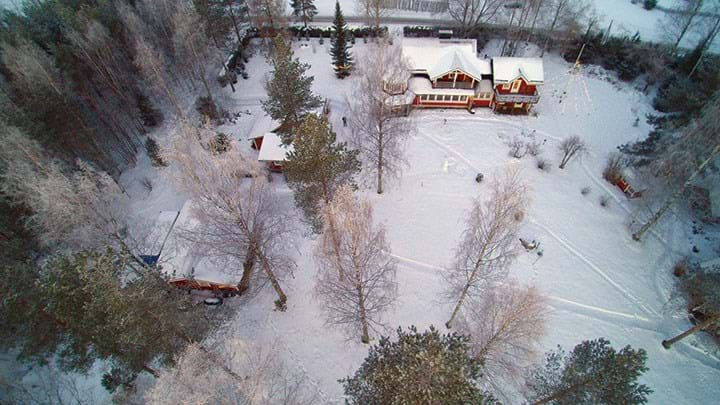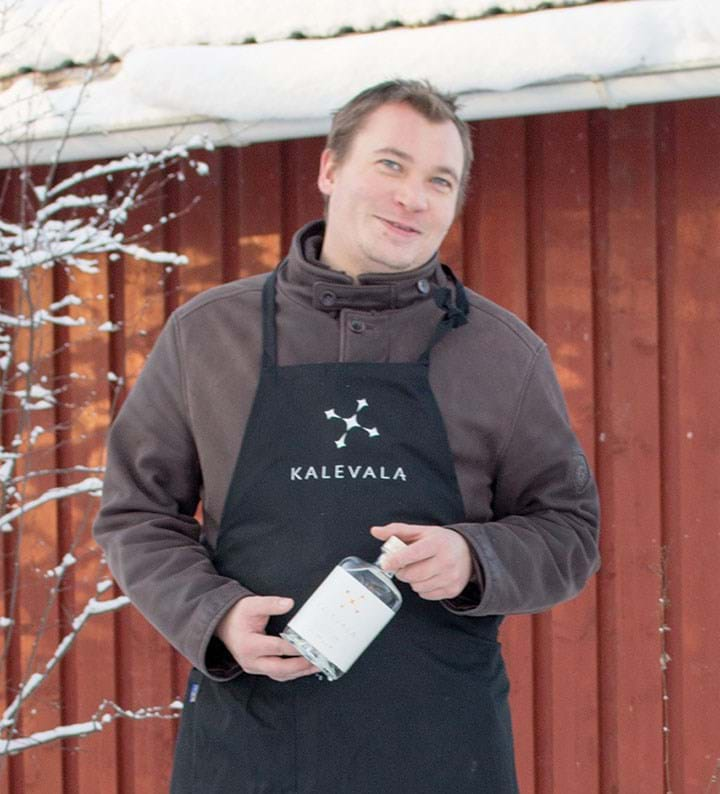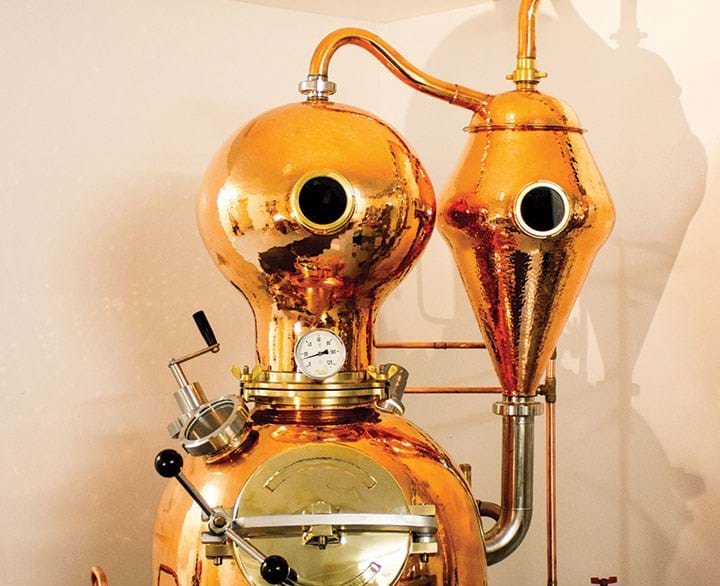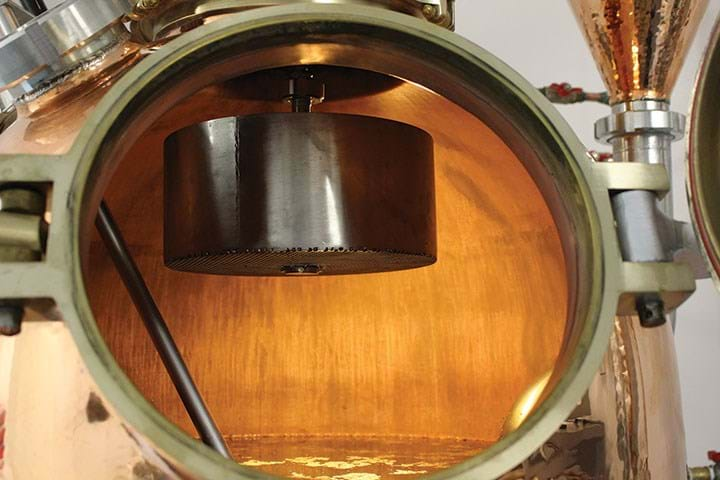Spirited Away
From studying undergraduate biochemical engineering at UCL, to distilling gin in Finland
WHEN I called Moritz Wüstenberg, he took a little while to answer the telephone. “Sorry,” he said when he picked up, “I got a new bottling machine, I was just assembling it.”
As you do. But the new bottling machine is sorely needed. Wüstenberg is the managing director of Northern Lights Spirits, a craft gin distiller based in north Karelia in eastern Finland. The company makes Kalevala, Finland’s only home-produced gin, which has won a number of international spirits awards. Last year, the company produced around 20,000 bottles. In 2017, Wüstenberg expects that figure to be closer to 40,000.
Gin is currently undergoing something of a boom, and small, craft distillers like Wüstenberg are taking advantage. Wüstenberg has a German father and a Finnish mother, but his journey into gin production began when he was still a biochemical engineering undergraduate at University College London (UCL) in the UK, where he studied from 2008-11.
“I registered as a sole trader in 2010, to get the alcohol licence so I could do some testing and some experimenting. From there it developed,” says Wüstenberg.
Four years ago, gin was almost unknown in Finland, but now, it is becoming much more widespread
After graduating from UCL, he moved to Finland, to begin a Master’s programme at Aalto University. In the second year, he spent half of his time at Aalto and half at the University of Eastern Finland (UEF), studying environmental engineering at the former, and energy and environmental law at the latter, where he obtained an LLM (Master of laws) in 2013. This was in addition to his MSc from Aalto, which he completed in 2014.
Moving to Finland and studying for his Master’s didn’t stop Wüstenberg’s interest in distilling. In 2013, he started limited company Northern Lights Spirits to make Kalevala. The Kalevala is actually the name of a work of Finnish epic poetry, consisting of 50 songs about Finnish folklore and mythology. Wüstenberg explains why they chose it as the name for the gin.
“The Kalevala is based in the same place that we produce the gin, so that’s the first reason – my mother is from this area. The Kalevala takes place around the area where we live, although everyone in Finland knows the story. Another, more practical reason maybe was that it’s not trademarked for these kinds of products, and we need to make sure we own the trademarks,” says Wüstenberg.

Keeping it local
The decision to go for gin was in part inspired by his time in the UK, where gin has always been popular. He says that four years ago, gin was almost unknown in Finland, but now, it is becoming much more widespread. The second attraction to gin was its versatility. To be gin, the main flavour of the spirit must be juniper berries, but after that, effectively the options for flavouring botanicals are limitless. Wüstenberg uses locally-sourced herbs and plants, to make gin with a distinctly Finnish twist. Wüstenberg explains that juniper itself is, in fact, quite Finnish.
“They say that Finnish people are‘juniper folk’. Juniper is something that you can bend but you can’t break it”
“They say that Finnish people are ‘juniper folk’. Juniper is something that you can bend but you can’t break. Finland was part of Sweden and has a history with Russia [which repeatedly tried to occupy and claim the country]. Actually, this year is the 100th anniversary of the independence of Finland,” he says.
Kalevala contains 13 different flavouring botanicals, all certified organic. The flavourings in the original Kalevala gin include sea buckthorn, a type of berry common in Finland, raspberry leaf and rosebuds. Kalevala Dry gin, which was launched this year to celebrate the 100th anniversary of Finnish independence, is flavoured with blackcurrant leaf and Jerusalem artichokes. As many ingredients as possible are sourced in the Karelia region.
“Even though our gin has Finnish ingredients, gin is international, and that’s something we aspire to, to make an international product, something people will understand in other countries and like to drink,” says Wüstenberg.

Making gin
All gins begin life as a neutral grain alcohol, to which flavourings are added. The exact recipe for Kalevala is, naturally, a secret, but Wüstenberg is happy to share the basics.
“What we do is take juniper, grind it and steep it in the alcohol so it macerates for 36 hours before we start distilling. 12 hours before, we will add some of the other ingredients,” he says.
The next stage is distillation in a copper pot still. This contains a tray, onto which more delicate flavourings, such as the rosebuds are placed. The vapour from the gin as it is distilled passes through and picks up the flavours. The vapour is then condensed. The resulting liquor must then be ‘cut’ to make it suitable for drinking.
“You can cut it only with water or with alcohol and water, the one-shot or two-shot method. This is for different products, some we cut, some we don’t, but this is a question of taste, not of being lazy, because the tastes can be quite strong sometimes if you don’t cut it with some neutral alcohol. Then, after that, you cut it with water to get it to drinking strength,” says Wüstenberg.

The chemical engineering part
The water is the other element that makes Kalevala special, and local. “We use our own water, from our own well at our site, to cut the gin to drinking strength. Many companies just use the mains water, so they don’t have to check the water quality. We have our own water treatment plant to make sure the quality is maintained. It’s quite regulated. The local council checks our water as well from time to time,” says Wüstenberg.
Knowing how to operate the plant and monitor and test the water is one of several areas where his chemical engineering knowledge is invaluable to the company. Handling the washing chemicals is also an important part of that knowledge, as is knowing how to meet fire and explosion regulations, with all that flammable ethanol vapour around, to make sure they can get an operating licence from the local council and the local fire department.
Knowing how to operate the plant and monitor and test the water is one of several areas where his chemical engineering knowledge is invaluable to the company
“You need to know the upper and lower flammability limits of ethanol and understand the whole concept. If this is something you don’t know, or you haven’t studied something in the area, like chemical or biochemical engineering, you wouldn’t be familiar with upper and lower flammability limits and also how to ventilate properly. Quite basic things, but you would have to pay someone else to do them, unless you’re a chemical engineer yourself!” Wüstenberg says.
He credits UCL’s biochemical engineering curriculum for giving him the right skills and knowledge to run his own business.
“I think most chemical engineers think it is quite simple to run a company and in terms of chemical engineering, it doesn’t require that many skills, but it’s the business skillset which is useful here. At UCL we had classes in business, which were compulsory, giving you theory in terms of how to start a business and how to run a business. We did a lot of theory but also a lot of practice. This knowledge can be applied to things like a bottling machine,” he says.
UCL’s course also includes other practical elements, for example a good knowledge of regulations. The money Northern Lights Spirits has saved in having a managing director with such a broad base of knowledge has been ploughed into more development and marketing.

What's next?
For Kalevala, as you might expect, the goal is expansion, although not too much. The aim is to keep the product fairly niche, rather than compete with the big brands like Gordon’s. On the day of the interview, Wüstenberg had just received a new distribution contract.
Kalevala is also about to welcome a third member in the family, in the form of Kalevala Navy Strength, which at 50.9% has a higher alcohol proportion than Kalevala and Kalevala Dry.
For Wüstenberg personally, the next priority is finishing a PhD in trade law at the University of Eastern Finland. His LLM at UEF sparked his interest in law, although he admits it is difficult to find time to research and write his thesis while he is so busy with everything else.
A chemical, or biochemical engineering degree can open the door to many opportunities, and this is something Wüstenberg has found.
“I think when you study, you never realise what’s going to be useful at some point, I guess that’s the same with anything, but when you start doing things, you see all the things you have learnt which you can put to good use,” says Wüstenberg.
Recent Editions
Catch up on the latest news, views and jobs from The Chemical Engineer. Below are the four latest issues. View a wider selection of the archive from within the Magazine section of this site.




